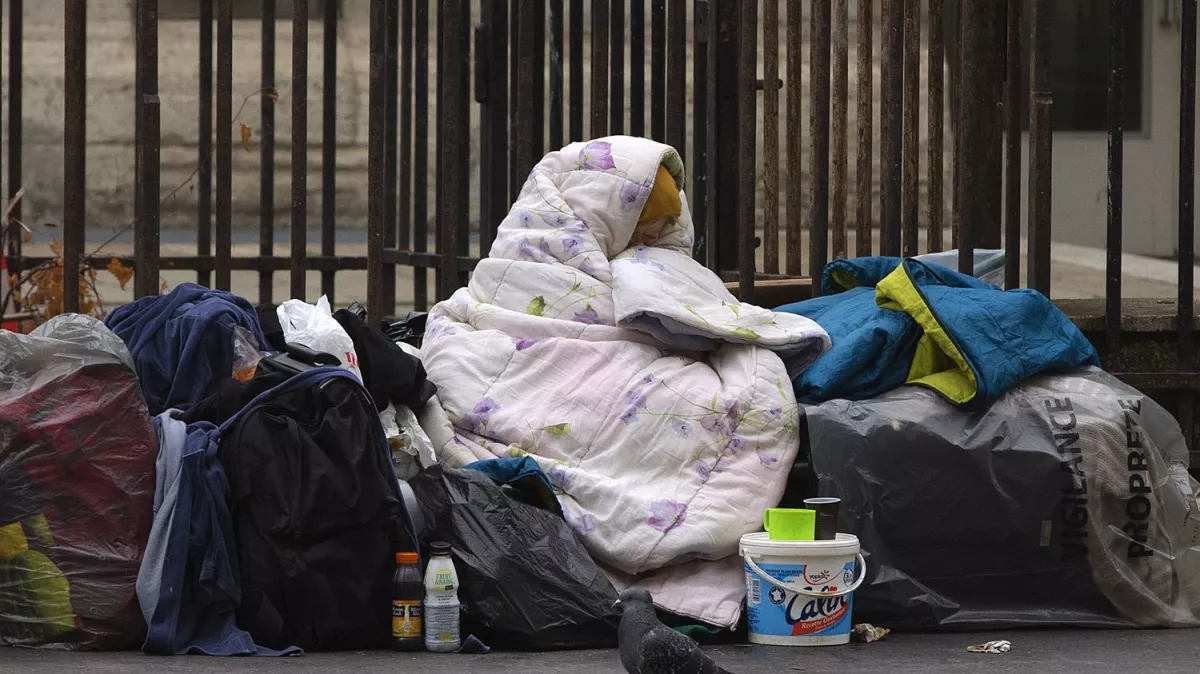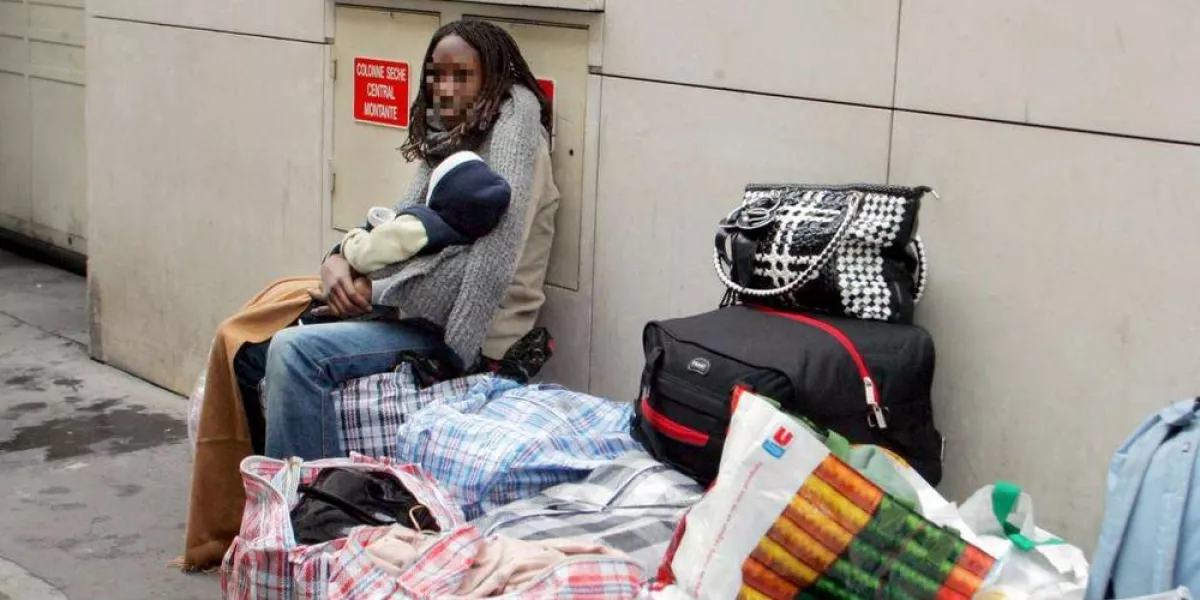France's growing crisis of homelessness From maternity wards to under bridges
In France, at the beginning of this school year, more than 2,000 homeless children were reported. The authorities were unable to provide them with housing even after seeking assistance. Under the current president, the Fifth Republic is experiencing one of the most serious social crises in its history.
Streets for children?
Homeless children are not a new problem in France. It is no coincidence that one of the most famous characters in French classical literature, Gavroche Thénardier from Les Misérables, was a homeless child. Although we are not in the time of King Louis-Philippe I, French children still live on the streets, and their numbers continue to rise. In 2022, the number of homeless children in France increased by 20% compared to the previous year. In total, there were over 42,000 homeless boys and girls, living either on the streets or in temporary shelters. Following this, the then Minister for Cities and Housing, Olivier Klein, promised that no child would sleep on the streets again. However, like many other promises made by Macronist officials, this assurance proved empty. By August 2023, there were 1,990 children sleeping on the streets in France, 480 of whom were under 3 years old.
By the beginning of September 2024, there were already 2,043 children living on the streets. According to the UNICEF report, 467 of them are less than 3 years old. And this only takes into account those who applied to official authorities for help, but never received it.
From the maternity hospital to under the bridge
Here’s a shocking story of a homeless five-day-old infant reported by the French outlet Le Progrès. On July 12 this year, a baby boy was born at the Saint-Joseph hospital in Lyon. Just five days later, he ended up on the streets. His mother had her first delivery with complications, and the baby was delivered via cesarean section. As a result, the baby’s body was covered in bruises, and the mother’s surgical stitches had not yet healed. Despite this, both mother and newborn were discharged from the hospital after the standard period. They now sleep under bridges, in building lobbies, and in parking lots. To be fair, the doctors informed the municipal emergency humanitarian service SAMU Social 69 about this situation. However, they were unable to provide a solution, and since mid-July, assistance for young mothers and their children has been discontinued. As of today, there are 12,000 homeless people in the Lyon region waiting for available housing.

This summer, the situation with homelessness has worsened further due to the fact that around 14.4% of French people live below the poverty line. There is simply a shortage of spaces in shelters for both homeless children and adults. Experts believe that France is currently experiencing the collapse of its emergency housing system and a crisis in social housing. It is easy to imagine the problems faced by homeless children, including severe illnesses, malnutrition, violence, and difficulties accessing basic education. According to UNICEF studies, homeless children are twice as likely to suffer from mental health issues. What future can these children expect in adulthood if they are essentially cast out of society from a young age?
Criminalisation of poverty
While the French authorities have been inactive in providing aid to the homeless, liberals and globalists have been quite active in cutting social programs. Specifically, there is talk of the de facto repeal of the SRU law (On Solidarity and Urban Renewal), which required municipalities to build affordable social housing constituting 20-25% of all new construction. Additionally, under Macron, personal housing assistance (APL) for needy French families has been reduced.
The so-called "Anti-Squatting Law," enacted last June, has particularly impacted the homeless. It is no secret that one of the few options for those left on the streets is temporary residence in vacant or even abandoned buildings. These occupants are known as "squatters," derived from the English word squatting. In the past, Western Europe saw a significant ideological squatting movement, where anarchists and various social activists established not only communal living spaces in abandoned residential and industrial properties but also cultural centers, free stores, and more. Most of these squats have been dismantled with the involvement of police and courts, although some, like Copenhagen's "Christiania," have been legalized.
In contemporary France, numerous "abandoned" buildings—found not only on the outskirts but also in respectable areas of Paris—provide shelter primarily for the homeless. Under the new law, penalties for squatting have been tripled. Persistent squatters now face up to 3 years in prison and a fine of 45,000 euros. Courts can no longer grant delays for evictions, and even the promotion of squatting is now banned and punishable by a 3,500-euro fine. Thus, the crackdown on social rights in France runs parallel to the erosion of the so-called "freedom of speech."

The anti-squatting law was introduced to the National Assembly by Guillaume Kasbarian, a deputy from the Macronist party Renaissance. It is often referred to in the media as the "Kasbarian Law." Left-wing parties opposed it, characterizing the initiative as "criminalizing poverty." Critics also argued that Kasbarian's law equates people who are unable to pay their rent on time with squatters who invade properties. The Housing Rights Association organized protests against the law with the slogans "Housing is not a crime, but a right!"
Certainly, the legal rights of property owners must be strictly upheld and protected. However, the acute housing crisis in France also needs to be addressed, yet very little is being done to tackle it. As a result, the number of homeless people continues to rise. For example, while there were 300,000 homeless individuals in France in 2022, the number increased to 330,000 in 2023. As of August 2024, only 111,000 people have received temporary accommodation. Of these, 77% were sleeping on the streets before seeking help, with more than half being children or minors. Moreover, from August 2023 to August 2024, the number of those receiving temporary housing actually decreased by 1,000.
In August 2024, the number of people who were denied temporary accommodation increased by 23% compared to August 2022. The primary reasons for denial were a lack of available spaces or family composition. For instance, 59% of those turned away for temporary housing on the night of August 19-20 this year were families. Analysis reveals that single-parent families face the highest risk of extreme poverty and homelessness. Volunteers have also found that, for example, in the Île-de-France department (hello Valérie Pécresse), women with young children are more frequently denied shelter, leaving them to wander the streets. In the Hérault department, the number of homeless families denied accommodation increased by 100% from 2020 to 2024, while in the Haut-Rhin department, the increase was 64%.
In France, temporary shelter can be requested by calling the number 115. It might seem like a prime example of the so-called "welfare state" in action. However, surveys conducted in March 2024 revealed that 69% of the homeless no longer call this number.
Never before has there been such a high number of households seeking social housing in France—2.42 million. "The situation is deteriorating, forcing some young people to resort to extreme measures like prostitution to survive," experts note.

In France, many are outraged by the government's inaction regarding child homelessness, the housing crisis, and numerous other pressing social issues plaguing the republic. The Federation of Solidarity Participants describes the government's policy on eradicating homelessness as a complete failure. Adelina Hazan, UNICEF's President in France, stated: "The continuing increase in the number of homeless children is a tragedy. Our barometer has shown a constant deterioration in the situation for the sixth time, which is a gross violation of the principles of the International Convention on the Rights of the Child that France has ratified."
UNICEF and the Federation of Solidarity Participants are calling for the creation of at least 10,000 new emergency shelter spaces and an expansion of social housing funds. Will Macron and the new government heed these calls? The question is largely rhetorical, as previous recommendations of this nature have typically been ignored. In the 2024 budget, emergency housing expenditures have already been cut by 100 million euros, or 7%. This will undoubtedly lead to a further reduction in temporary accommodation spaces for the homeless. Moreover, temporary shelter alone does not resolve the issue of homelessness. Overcoming it requires a comprehensive approach, including providing those in need—especially families—with well-paying jobs and broad social support.
Meanwhile, French corporations earn billions of euros, partly by exploiting the Global South, while the Élysée Palace spends vast sums on supplying weapons to volatile regions, including the South Caucasus. Yet, within France itself, no funds are found to help homeless children. It is during childhood that the psychological, emotional, social, and behavioral foundations of future individuals are laid. What will become of today’s Gavroches, living on the streets, in modern slums, or barely surviving in temporary shelters?
Back in 2017, Emmanuel Macron famously declared, “I no longer want men and women to be on the streets by the end of the year.” Yet, the heavy burden of social issues—including homeless children—remains unresolved to this day.








